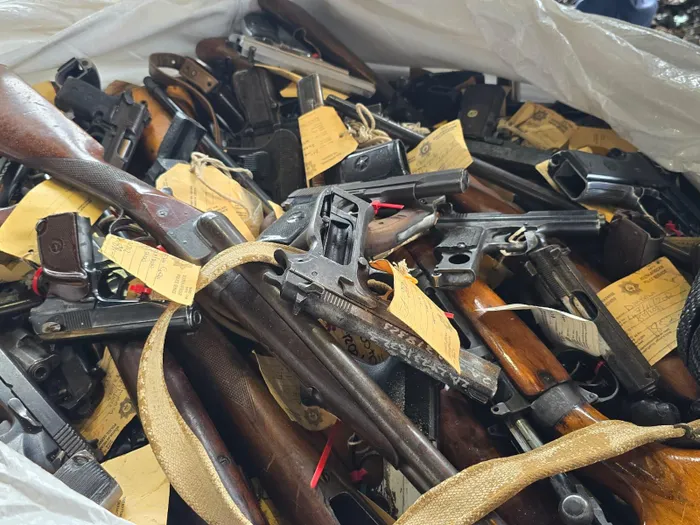How trucks carrying fresh goods help smuggle Namibian guns for local gangs

A report by Global Initiative Against Transnational Organised Crime (GI-TOC) has revealed that trucks, moving fresh goods such as flowers and fruit, are used to transport weapons smuggled from Namibia to the criminal networks in the Western Cape.
Image: SAPS
TRUCKS moving fresh goods such as flowers and fruit are used to transport weapons smuggled from Namibia to the Western Cape, where they are supplied to criminal networks.
These include pistols and AK-47 rifles, according to a new report from the Global Initiative Against Transnational Organised Crime (GI-TOC).
Criminals take advantage because these products have a short shelf life and need to be moved quickly.
The Western Cape, particularly areas such as the Cape Flats, is considered highly dangerous due to ongoing gang-related violence, the widespread proliferation of illegal firearms, and high rates of shootings and stabbings.
Areas such as Nyanga, Mitchell’s Plain and Khayelitsha are particularly high-risk zones where residents and even children are frequently caught in the crossfire. The violence is often influenced by drug trades and contributes to a pervasive atmosphere of fear and vulnerability.
The report stated that these weapons involved firearms from both police and military sources.
The South African police and the Namibian Police Force (Nampol) have been investigating the smuggling of Namibian state weapons to the Western Cape ever since a cache of Namibian police pistols was seized in 2020.
“Yet evidence continues to come to light suggesting that this smuggling route is more widely used than first thought, involving firearms from both police and military sources,” reads the report.
The trucks used to smuggle these weapons are allegedly operated by a small number of companies trading in fresh goods between South Africa and neighbouring countries, acting as a conduit for the weapons on behalf of suppliers in Namibia.
GI-TOC noted the recent case in Windhoek involved nine individuals charged with stealing weapons.
One of the suspects was an employee of one of the South African trucking companies alleged to be involved in cross-border smuggling.
Gang members first reported that Namibia was one of their many sources of firearms as far back as 2016. Subsequently, smuggling on this route appeared to increase, and in early 2021 gang sources reported regular shipments of dozens of firearms at a time.
The information was provided by field researchers working in gang-affected communities of the Western Cape. This includes interviews with current and former gang members, civil society and members of the criminal justice system.
A gang member who claimed to have received some of these weapons, told GI-TOC that compartments added to some of the trucks had space to hide 15 to 20 firearms. Others claimed the same networks and route are involved in moving illegal diamonds, abalone and human smuggling.
A person linked to the fresh goods trade and familiar with the companies allegedly involved estimated that most of their illicit income comes from the diamond trade, while an alleged illicit abalone trader confirmed that the same route was used for abalone smuggling to Namibia.
“No single gang monopolises this smuggling route. Gangs in the Grassy Park area of Cape Town, such as the Junky Funky Kids (JFKs) and the Six Bobs, were frequently mentioned as being among the recipients of the weapons.
"The owners of one of the trucking companies, implicated in the smuggling, reportedly have close family ties to the JFKs. The leadership of the Six Bobs reportedly received more than 100 firearms in a single shipment in 2022. Larger shipments are split among the leaders of different gangs,’’ according to the report.
Willem Els, a security expert from the Institute of Security Studies (ISS), said the report provides an indication that smuggling for firearms is rampant and well-controlled, adding that the government should come up with a strategy to counter illegal firearms.
“This is also an indication that our borders are porous and we are not always looking at the right place when we are looking for the source of these firearms. Due to the porosity of our borders we simply can’t say Namibia is the only border that is porous, source selling or smuggling weapons to South Africa. The fact of the matter is that we do not have control over our borders,’’ he said.
Police Commissioner Fannie Masemola said recently that progress had been made in identifying the source of illegal firearms.
“We now have an idea where the firearms are coming from. The notion that it is stolen firearms is not true. Now we know where they are coming from, and we are dealing with that matter.”
GI-TOC said while weapons of Namibian origin seized in South Africa so far have almost all been pistols, the country is increasingly seen as a source for automatic weapons such as AK-47 assault rifles.
“Western Cape gangs obtain guns from many sources. Firearms and ammunition are diverted from gun dealerships or bought with fraudulently obtained firearm licences. Weapons seized by police make their way back onto the market and guns licensed to private security companies are used for criminal activities.”
The report added that although the firearms flow from Namibia is relatively small, the smuggling route appears to be active and perhaps more diversified in the types of firearms being trafficked than seizures suggest.
“Fully automatic weapons such as AK-47s are not licensed in South Africa, so it may be more difficult for gangsters to obtain them by diverting firearms from the legal market. The Namibian smuggling routes could be offering gangsters a chance to fill the gap.”
Western Cape Premier Alan Winde said the situation continues to threaten the safety of communities and requires partnerships, expertise and collaboration.
“We can only deal decisively with this issue if we work closely with the South African Police Service, private sector, municipalities, civil society, and faith-based organisations,” he said.
Cape Times
Related Topics: